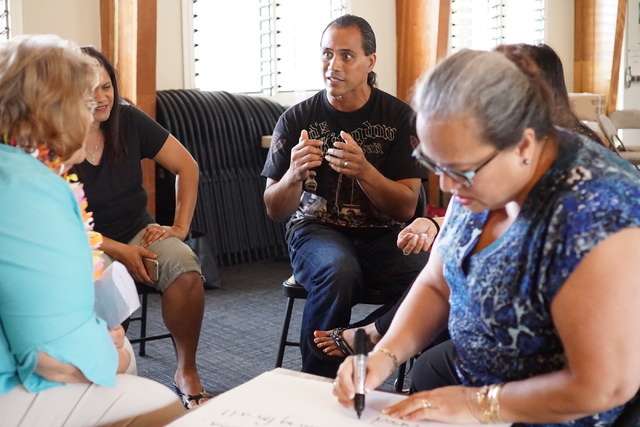KAILUA-KONA—Leaders from the island’s faith community came together Saturday to develop and share potential solutions to the crisis of human sex trafficking in Hawaii. ADVERTISING KAILUA-KONA—Leaders from the island’s faith community came together Saturday to develop and share potential solutions
KAILUA-KONA—Leaders from the island’s faith community came together Saturday to develop and share potential solutions to the crisis of human sex trafficking in Hawaii.
“We have got to get our kids off the street,” said Elizabeth Murph, Hawaii Island Community Director for Catholic Charities Hawaii. “There is no way the Lord is pleased with this, not when we have the means to deal with it.”
Melody Stone of the Hawaii Island Coalition Against Human Trafficking said that in the state of Hawaii, between 100 and 300 children run away or are considered missing every month.
And within 48 hours of going missing, she said, a third of them will be approached by a trafficker.
The summit, held Saturday morning at The Salvation Army in Kailua-Kona, brought together leaders of several Christian ministry groups, anti-trafficking groups and government organizations to explore ways to not only intervene and assist trafficking victims but also to prevent anyone from becoming a victim in the first place.
Stone said churches can often be “little islands on an island,” but events like Saturday’s summit can generate real methods for change.
“Sometimes we can come together and be stronger when we work as a team,” she said.
Some of the solutions are aimed at attacking some of the circumstances, such as homelessness, that push victims into the hands of traffickers.
“Once you’re homeless, it’s like all chaos breaks loose,” Murph said to the roughly two dozen people in attendance.
Murph spoke about “Family Promise,” an initiative that encourages churches and other potential hosts to collaborate in order to house homeless families.
The program brings together 13 “host agencies,” such as churches, which host families over the course of a week by providing them with a place to stay from evening to morning. At the end of the week, families move on to the next host.
Meanwhile, a family center provides access to phones, mail, laundry and other facilities for daytime use.
By rotating among host agencies, the families are housed for one full quarter of a year.
Because of the wraparound services to which families have access, Murph said families “are generally out and sustainable” before host agencies would see them again the next quarter.
Solutions will also require coordination with law enforcement and other parts of the community.
Dale Ross, first deputy prosecuting attorney at the Hawaii County Office of the Prosecuting Attorney, discussed strategies developed by the King County, Washington, Prosecuting Attorney Office to counter human trafficking.
The strategies, she said, break up responsibilities to tackle trafficking into sectors aimed at building partnerships with various parts of the community.
The sectors cover a wide cross-section of the community, targeting everything from health clinics to media to criminal justice, giving them all a role to play.
Ross stressed the importance of shifting the focus of law enforcement to recognize signs of trafficking as well as when and how to intervene.
There’s already been some training, Ross said, adding that they’ve received a grant to bring in advanced training for prosecutors and detectives.
She also stressed the importance of outreach to “at-risk” groups, such as youth living on the streets or foster children.
“I think that it’s really critical that we form good relationships with them,” Ross said. “Maybe they’re not ready to come in, but they have people out in the community they know care about them and have an ear out.”



